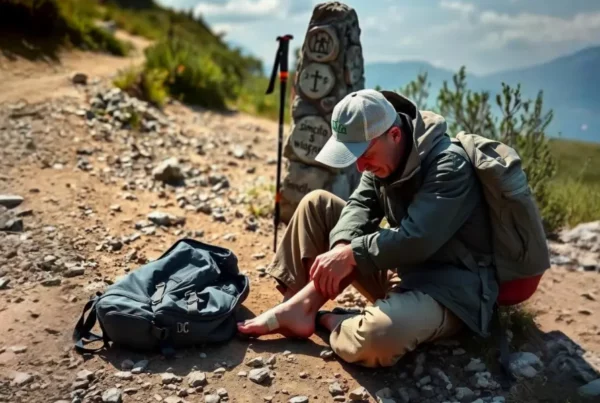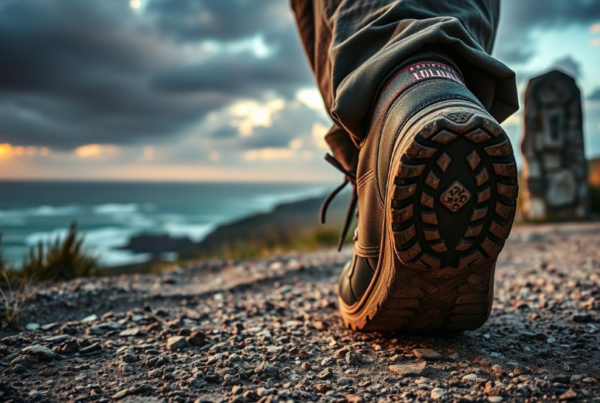Long-distance walking is more than just a physical challenge: it can be a transformative journey for both the body and mind. For those embarking on the Camino Santiago, the impact often goes far beyond reaching Santiago de Compostela. This article explores the scientifically-backed long walk benefits that enhance fitness and mental health, highlighting why the Camino is a powerful path toward personal well-being.
Whether you’re preparing for your first pilgrimage or reflecting on a past one, understanding the holistic benefits of long-distance walking can deepen your appreciation for the journey. From reduced stress to cognitive clarity, let’s explore what makes walking such a life-affirming act.
The Science Behind Long Walk Benefits
How Walking Boosts Neurochemistry
Long walks stimulate the release of endorphins, dopamine, and serotonin: neurotransmitters associated with pleasure, motivation, and emotional balance. This “natural high” is not anecdotal. Research confirms that aerobic exercise like walking activates a cascade of biochemical responses that promote lasting feelings of well-being.
- Endorphins: Provide pain relief and euphoria.
- Dopamine: Enhances motivation and satisfaction.
- Serotonin: Helps stabilize mood and reduce symptoms of depression.
Lower Stress Through Cortisol Regulation
Extended walks regulate the hypothalamic-pituitary-adrenal (HPA) axis, reducing basal cortisol levels. This hormonal balance is crucial for stress resilience, better sleep, and improved emotional regulation, all of which are commonly reported by pilgrims along the Camino.
Attention Restoration in Nature
The Camino Santiago, with its changing landscapes, offers more than scenery. Nature-based walking aligns with the Attention Restoration Theory, which suggests that natural environments restore our ability to focus by engaging involuntary attention and allowing directed attention to rest.
Physical and Psychological Fitness Benefits
Cardiovascular and Muscular Gains
Consistent walking improves endurance, lowers blood pressure, and strengthens major muscle groups. Over time, pilgrims notice increased stamina, better joint mobility, and greater respiratory efficiency. This combination makes it an excellent practice for anyone focused on long-term health goals.
Enhanced Mental Clarity and Mood
Short-term gains include clearer thinking and lower anxiety levels. Long-term walking routines have been linked to reduced risk of dementia, greater hippocampal volume, and cognitive resilience in aging populations.
Self-Esteem and Motivation
The sense of achievement after completing each stage of the Camino enhances self-efficacy and confidence. According to the Self-Determination Theory, these gains fulfill basic psychological needs for autonomy, competence, and connection.
Tips for Maximizing the Benefits of Your Camino Walk
- Walk at your pace: Avoid competition. The benefits are most profound when the pace is intuitive and sustainable.
- Choose natural trails: Forested or coastal paths enhance the mental health effects.
- Reflect regularly: Journaling or moments of quiet reflection reinforce the emotional insights of your journey.
- Fuel your body well: Balanced nutrition supports both energy and recovery.
- Sleep deeply: Recovery is key. Prioritize good sleep hygiene in albergues or private stays.
For additional guidance, check out our complete guide to the Portuguese Coastal Way.
Common Questions About Walking the Camino
How long should I walk to feel the benefits?
Most studies indicate that sessions over 45 minutes in duration provide measurable benefits to mood, memory, and stress regulation.
Is walking really enough to improve fitness?
Yes. When done consistently over several days or weeks, long walks provide cardiovascular improvements comparable to more intense workouts.
Can I still benefit if I don’t walk every day?
Absolutely. Even a few stages of the Camino can offer profound insights and health gains. Consistency over intensity is key.
Related Reading and Resources
- Learn more about the rich history of Santiago de Compostela and how it adds cultural depth to your walk.
- Explore the differences between routes with our comparison of the Portuguese Way vs other Camino trails.
The Camino Santiago as a Path to Wholeness
Walking the Camino Santiago isn’t just a travel goal: it’s a path to deeper health, inner peace, and renewed purpose. The combination of movement, nature, solitude, and community generates a synergy that no single wellness trend can match.
So, whether you’re walking to heal, to think, or simply to move forward, remember that every step is building more than endurance: it’s building a better you.
Join the Conversation
Have you experienced the mental clarity or emotional release that walking brings? Share your story in our Pilgrims of the Coast WhatsApp community and connect with others on the same path.
Scientific References and Sources
- Berman, M. G., Jonides, J., & Kaplan, S. (2008). “The Cognitive Benefits of Interacting with Nature.” Psychological Science, 19(12), 1207–1212.
- Hillman, C. H., Erickson, K. I., & Kramer, A. F. (2008). “Be smart, exercise your heart: exercise effects on brain and cognition.” Nature Reviews Neuroscience, 9(1), 58–65.
- Mikkelsen, K., Stojanovska, L., Polenakovic, M., Bosevski, M., & Apostolopoulos, V. (2017). “Exercise and mental health.” Maturitas, 106, 48–56.
- Thompson Coon, J., Boddy, K., Stein, K., Whear, R., Barton, J., & Depledge, M. H. (2011). “Does participating in physical activity in outdoor natural environments have a greater effect on physical and mental wellbeing than physical activity indoors?” Environmental Science & Technology, 45(5), 1761–1772.






